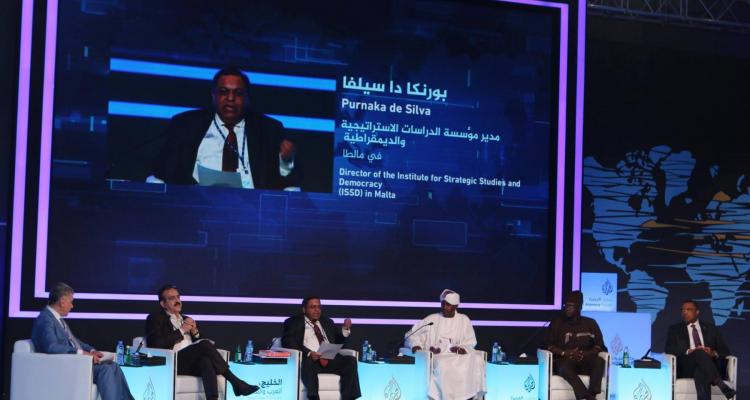
On the second day of the 12th Al Jazeera Forum, 29 April, the forum’s sixth session was held in collaboration with the Al Jazeera Public Liberties and Human Rights Centre under the title, “The media during times of crisis and transitional stages”.
The session featured Yehia Ghanem, the Managing Editor of Al-Ahram International and Supervisor of Arab Reporters for Investigative Journalism Network; Purnaka de Silva, Director of the Institute for Strategic Studies and Democracy (ISSD) in Malta; Elsadig Ibrahim Ahmed Ibrahim, President of the Sudanese Journalists General Union; Abdulwaheed Odusile, President of the Federation of African Journalists (FAJ) and the Nigerian Union of Journalists (NUJ); and John Yearwood, Director of the Executive Board of the International Press Institute (IPI) and President and CEO of Yearwood Media Group.
In his presentation, Ghanem held that Al Jazeera has redefined and reformulated field journalism so much that it is no longer confined to, or necessarily reliant on, the newsroom. He explained that this is an aspiration unattained by most international media. Furthermore, he argued that Al Jazeera also focused on “people in the periphery”, away from central power, and presented itself as a media organisation speaking on behalf of the global south in the face of Western imperialist media that have dominated the arena for centuries, noting that Al Jazeera has adopted a different approach in tackling human issues.
On his part, de Silva stated, "Media undoubtedly affect policies and decision-making, especially when it comes to the humanitarian field.” He added that the media and the press reach millions of people and give voice to those who were voiceless as well as those suffering from human rights violations and genocide. "Contemporary history bears witness to the inhumanity of some people," he declared.
Ibrahim, however, argued, "The talk about humanitarian media highlights major issues and crises, such as wars, unrest, and disasters in the East African region. In this region, the images the media portray are darker in light of conflicts and human rights violations such as human trafficking.” He added that media in these areas faces great challenges, as the authorities seek to control its activity and restrict journalists from covering these phenomena. "If we examine [areas of conflict], we will see that the media follows only the official narrative of the issues," he affirmed.
On the other hand, Odusile believes that journalists sometimes become part of conflicts. "We do not have to create the news; we just cover it. We do not invent it, we only have to observe the professional conventions that control the journalist's behaviour so as not to lose objectivity. In order to avoid risks, a journalist should not become part of the story."
Finally, Yearwood explained that there are issues that govern the media situation in the midst of conflicts. He said that, in this context, there are three responsible parties: the governments, the journalists and media institutions, and the public.

